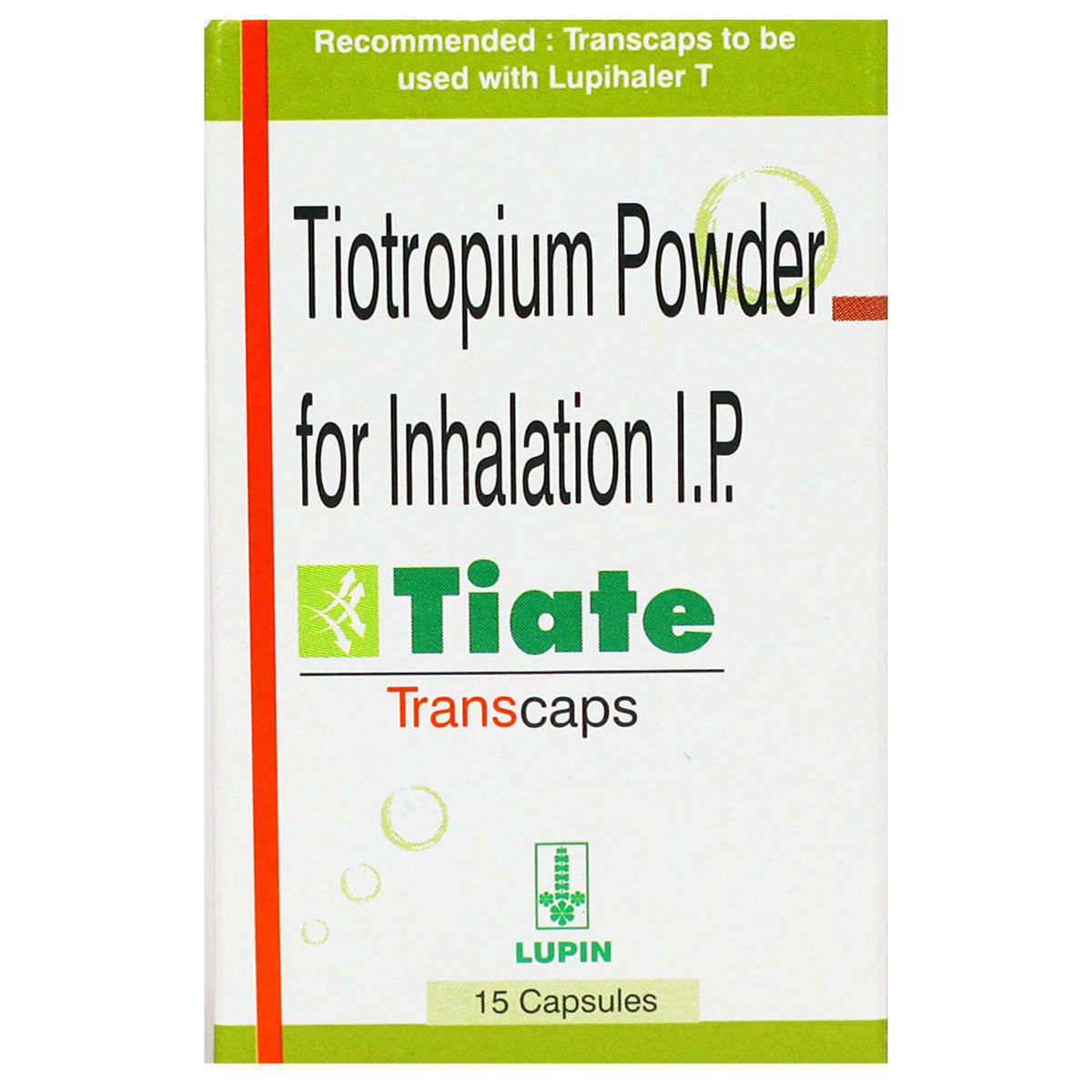Aerotrop Inhalation
₹155.88*
MRP ₹173.2
10% off
₹147.22*
MRP ₹173.2
15% CB
₹25.98 cashback(15%)
Free Delivery
With Circle membership
(Inclusive of all Taxes)
This offer price is valid on orders above ₹800. Apply coupon PHARMA10/PHARMA18 (excluding restricted items)
Know Your Delivery Time
Provide Delivery Location

Available Offers
 Prescription drug
Prescription drugWhats That

Secure Payment

India's Most Trusted Pharmacy

Genuine Products
Composition :
Manufacturer/Marketer :
Consume Type :
Return Policy :
About Aerotrop Inhalation
Aerotrop Inhalation is used to treat asthma and Chronic Obstructive Pulmonary Disease (COPD). Asthma is a chronic (long-term) respiratory condition in which airways narrow, swell and produce extra mucus, leading to difficulty breathing. COPD is a group of lung diseases with emphysema (shortness of breath) and chronic bronchitis (inflammation of the lining of bronchial tubes).
Aerotrop Inhalation contains ‘Tiotropium’, which works by blocking the receptors for acetylcholine, which are released in the cholinergic nerve endings in the airways. Aerotrop Inhalation relaxes and widens the airway's openings, making it easier for the air to get in and out of the lungs. Thus, it provides relief from asthma and COPD.
Aerotrop Inhalation is meant for inhalation only; do not swallow Aerotrop Inhalation. You are advised to use Aerotrop Inhalation for as long as your doctor has prescribed it for you, depending on your medical condition. In some cases, you may experience certain common side effects such as dry mouth, stomach upset, constipation, blurred vision, chest pain and cold symptoms. Most of these side effects do not require medical attention and will resolve gradually over time. However, you are advised to talk to your doctor if you experience these side effects persistently.
Please do not stop taking Aerotrop Inhalation on your own as it might cause worsening of symptoms. Consult your doctor before taking Aerotrop Inhalation if you are pregnant or breastfeeding. Aerotrop Inhalation may cause dizziness, so drive with caution. Avoid consuming alcohol as it might cause increased dizziness. Aerotrop Inhalation is not recommended for children below 6 years as the safety and effectiveness have not been established. Keep your doctor informed about your health condition and the medicines you are taking to avoid unpleasant side effects.
Uses of Aerotrop Inhalation
Directions for Use
Medicinal Benefits
Aerotrop Inhalation belongs to the group of anti-asthmatic medicines called bronchodilators used to treat asthma and Chronic Obstructive Pulmonary Disease (COPD). Aerotrop Inhalation works by blocking the receptors for acetylcholine, which are released in the cholinergic nerve endings in the airways. Aerotrop Inhalation relaxes and widens the airway's openings, making it easier for the air to get in and out of the lungs. Thereby helps in treating asthma and COPD. Regular use of Aerotrop Inhalation can help with ongoing shortness of breath related to diseases like asthma. Daily use of Aerotrop Inhalation can also help prevent sudden, short-term worsening of COPD symptoms that might last for several days. Aerotrop Inhalation is also used as an adjunct to other medicines to treat asthma.
How Aerotrop Inhalation Works
Storage
Side Effects of Aerotrop Inhalation
- Dry mouth
- Stomach upset
- Constipation
- Blurred vision
- Chest pain
- Cold symptoms
What if I have taken an overdose of Aerotrop Inhalation
Drug Warnings
Do not use Aerotrop Inhalation if you are allergic to any of its contents. Inform your doctor before taking Aerotrop Inhalation if you have narrow-angle glaucoma, prostate problems or difficulty in urination, kidney, liver disease, cystic fibrosis, or have suffered from myocardial infarction (heart attack) during the last 6 months, irregular heartbeat or heart failure. Consult your doctor before using Aerotrop Inhalation if you are pregnant or breastfeeding. Aerotrop Inhalation may cause dizziness, so drive with caution. Avoid consuming alcohol as it might cause increased dizziness. Aerotrop Inhalation is not recommended for children below 6 years as safety and effectiveness have not been established. If wheezing or chest tightness worsens, please consult a doctor immediately. These might be signs indicating that your asthma is not controlled properly and requires an alternate or additional treatment.
Diet & Lifestyle Advise
Eat a healthy diet and exercise regularly to strengthen your breathing muscles and boost your immune system.
Avoid foods such as cabbage, beans, garlic, onions, shrimp, pickled food, dried fruits, fried foods, carbonated drinks, wine, bottled lemon and lime juice as it may worsen asthma symptoms.
Do meditation, deep breathing, regular exercise and try progressive muscle relaxation techniques to relieve stress and reduce the risk of an asthma attack.
Quit smoking as it may reduce the effectiveness of the Aerotrop Inhalation and irritate the lung, worsening breathing problems.
Learn breathing exercises like pursed-lip breathing will help you move more air in and out of your lungs.
Habit Forming
Therapeutic Class
Aerotrop Inhalation Substitute

Tiova Rotacap 30's
by AYUR
₹10.79per tabletTiate Transcaps 15's
₹21.57per tabletTiomist Respicaps 15's
₹10.77per tabletAerotrop Capsule 30's
₹10.79per tabletTiova Rotacaps 15's
₹21.57per tablet
Product Substitutes
Alcohol
Unsafe
You are advised not to consume alcohol while taking Aerotrop Inhalation as it might cause increased dizziness.
Pregnancy
Caution
Aerotrop Inhalation belongs to pregnancy category C. Please consult your doctor if you have any concerns regarding this, your doctor will prescribe only if the benefits outweigh the risks.
Breast Feeding
Caution
Consult your doctor before using Aerotrop Inhalation, your doctor will decide whether Aerotrop Inhalation can be taken by breastfeeding mothers or not.
Driving
Caution
Aerotrop Inhalation may cause dizziness or blurred vision. Do not drive or operate machinery unless you are alert.
Liver
Caution
Dose adjustment may be needed. Please consult your doctor before using Aerotrop Inhalation if you have liver impairment/liver disease or any concerns regarding this.
Kidney
Caution
Dose adjustment may be needed. Please consult your doctor before using Aerotrop Inhalation if you have kidney impairment/kidney disease or any concerns regarding this.
Children
Caution
Aerotrop Inhalation is not recommended for children below 6 years as the safety and effectiveness have not been established.
FAQs
Country of origin
Manufacturer/Marketer address
Disclaimer
Author Details
We provide you with authentic, trustworthy and relevant information


















